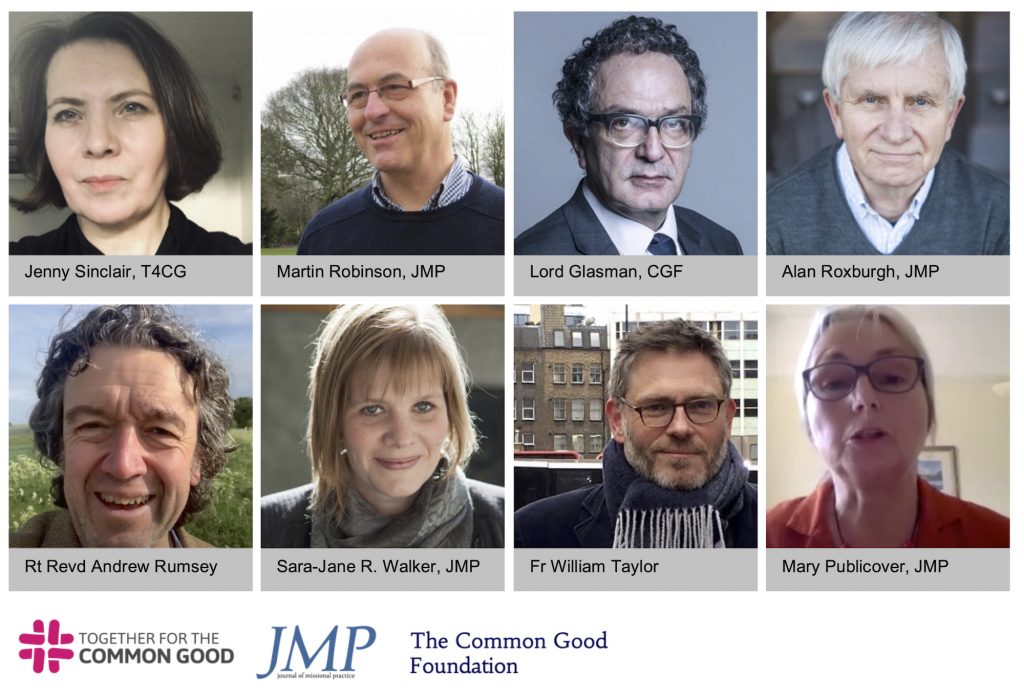
This is the second in a series of three open letters to the churches during the pandemic, written by a group of friends informally known as the Friday Group. This group was convened in early 2020 by Together for the Common Good and continues to meet weekly. This particular letter was written jointly by Jenny Sinclair (Founder and Director, T4CG); Alan Roxburgh, Martin Robinson, Sara Jane R. Walker and Mary Publicover (Journal of Missional Practice); Lord Maurice Glasman (Common Good Foundation) and Fr William Taylor. It was originally published on this website on 1 September 2020. You can download the three letters in a single pdf HERE
The letter is accompanied by a webinar which you can view HERE.
Renewing the Covenant: Churches and the Building of Local Relationships
Dear Friends in Christ, fellow travellers in these challenging times, we are wanting to follow up with you after so many of you responded to the publication of The Plague and the Parish. It was written just as the Covid-19 pandemic entered our worlds, in part, as a call for our churches to bring their vocation in Christ to the re- weaving of a torn social fabric. Since then the consequences of the pandemic have intensified. Uncertain, anxious times will continue for months to come, presenting us all with the challenge of caring for one another and reimagining how to live faithfully. The pandemic has elicited a number of immediate responses. Our energy has been on understanding and managing this new reality and its impact on our social life, from isolation, to unemployment, to death. We’re living with overwhelming questions about how we live as a society amidst the possibility of economic collapse and a growing sense that other human beings are now a threat. We are wrestling with the inadequacy of our institutions at national, regional and local levels.
A FAILED STORY AND LOSS OF CIVIC LIFE
Over these months our reactions have ranged from confusion and fear, to anxiety, anger, and exhaustion. Now, almost six months on, the overwhelming mood has become one of grief. This grief is certainly about mourning, isolation, and the fear of economic insecurity. Those of us in Christian leadership also have a sense that much of our formation and training has not prepared us for this moment. Yet there is a deeper level to this grief that is hard to put into words.
We find ourselves in a space where the primary stories for addressing our situation are being given to us either by science (trust the science and we will find a vaccine) or by government (our legislators will find the funds to keep us afloat until the vaccine is found). While these stories are important, they cannot touch what is a much more profound sense that our collective hope has been reduced to crisis management, and that this is insufficient to sustain us. We are seeing the failure of a culture which has infected our way of living, and that is a culture which is based on contract.
This grief is a malady of the soul. It consists of two elements.
First, the presence of a story that is no longer working. Implicit in The Plague and the Parish is a critique of what the modern story has done to our civic space, to our parishes, and to the congregations that dwell in these spaces. The story of the modern West is about a society built around transactional exchanges, managed by contract, determined by globalized economics. The results are increasingly clear – the evisceration of civic life, the thinning out of local forms of a common life that would enable communities to work out their challenges with one another, and social isolation, even between people who live in the same neighbourhood.
This overarching story has been shaped around the idea of “progress” and by the belief in radical individualism as the dominant operating system. In this context, our churches have complied with an unofficial social contract, and have continued to make “socially useful” contributions, but their influence has drained away. Our distinctive calling as witness to the sacred and as a faithful neighbour has diminished. This has left many church leaders confused about their place in society and even in their identity as leaders.
The second element is the absence of alternatives to this failed story. The dominance of this ideology has resulted in a loss of memory that things could be any other way. The result is the emptying out of civic life, the unravelling of our social systems and our confusion as followers of Christ in how to respond.
FROM CONTRACT TO COVENANT: A FIRST STEP TOWARDS THE NEW CHAPTER
We are convinced that there is another story. There is within the memory of the church a story of being a people who do not need to be shaped by social contract, consumerism and individualism. Our vocation is rooted in the reality of Christ living in us and, therefore, by God’s relationship with us. We know that apart from him we can do nothing. Covenant, not contract, is at the heart of our vocational calling. Our vocation is not to be useful but transformative.
The Christian story breathes an alternative imagination expressed in the embodied Christ and through the language of covenant. This is an alien word for most of us. Simply put, as followers of Jesus, we know that human beings are not to be defined primarily by function or transaction, but by our inherent God-given dignity, and by relationships that are characterised by trust and mutual flourishing.
Covenant in Scripture has an expansive meaning which can have a transformational effect on our relationships, our churches and our civic communities. It is about God’s unconditional promise to us in Christ. It speaks to the ties that bind us together in ways that lead to the remaking of social life. It re-weaves the bonds of trust between generations and interests. It requires a commitment to love one another, and an accountability earthed in the place where we live – in biblical terms, the land itself is treated as a covenantal partner – and in our local institutions. Through our Scripture, we learn that our institutions are to be formed and judged on the basis of this covenant rather than on contract or economics. They are to be durable and faithful across generations. Historically, we can see that in their origin and intention, church, parish, trusts and endowments, the common law, Parliament and our liberties come from this covenantal understanding of Christian life.
CHURCHES IN COVENANT WITH NEIGHBOURS
To heal the malady of our collective soul we need a bigger story. The transition to the new chapter ought to be led by churches but so far we have been largely absent from the field. Internal interests, such as financial imperatives, closures, social distancing and the shifting of worship online may seem to be requirements of survival but they obscure our ability to remember who we are called to be.
The emerging racial tensions of recent months also increase the risk that we fail to confront the implications of a culture that is fundamentally geared to dehumanising human beings. People look to churches to offer some resistance and to stand for human relationships in an increasingly inhumane world. We must point to a way forward that transcends division and brings healing.
A renewal of covenant as an essential part of our Christian narrative is a primary way our churches can write the new chapter. To do that we need to begin in the local, the parish, the neighbourhood. This will require us to be physically present, in relationship with people and with place.
It will involve congregations discerning how they might covenant with neighbours and other local institutions in their parish or locality in order to generate a renewed civic life. On a very practical level, a place to begin would involve taking on practices of commitment and love. Practices rooted in our bond with Christ, which make us available and vulnerable through relational engagement alongside the people in our communities.
There is no avoiding one-to-one conversation as the central practice.
As the economic fallout of the pandemic thunders on, as redundancy and eviction notices are handed out, the need for this new story becomes more acute. Our civic immune systems have been weakened by contract and they need strengthening by covenant. This is relational work.
A first step towards developing a covenantal culture in our local communities might be that we, as congregations, focus our vocation toward building local relationships. This means getting to know our neighbours in one-to-one conversations. It means loving friendships of reciprocity, being a good neighbour willing to stand in solidarity when it counts.
This is the shift from contract to covenant. Our humble churches diminished, but fulfilling an authentically Christ-centred, civic role alongside neighbouring local institutions, building a common good between different interests.
This would be one of the ways of living into the prayer “Your kingdom come”.
If you feel things don’t need to be as they are, you are right. If you can see that this contract culture is affecting the life of your church, your neighbourhood and your country, you are right. The threads of civic life cannot be re-woven based on contract. In the life of the Spirit, we are social beings, created and wonderfully made to live in relationship. As this pandemic proceeds, grief becomes more pronounced and the need for a bigger, more substantive story grows. Christian communities can become embedded in the local, in a life of covenant relationship. This is the nature of the radical renewal to which God is drawing us.
This letter is one of the fruits of the ongoing conversation among our Friday Group which is framed by a generous and generative partnership between T4CG, JMP and CGF.

Like what you are reading? More inspirational content from Jenny Sinclair can be found here: https://togetherforthecommongood.co.uk/news-views/from-jenny-sinclair
